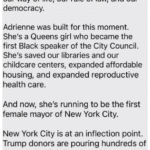As New York’s top prosecutor faces federal investigation, her campaign activities for Adrienne Adams raise serious questions about the misuse of official position
 When New York’s top law enforcement officer uses her official title to solicit campaign donations, where exactly is the line between public service and political activity? This question demands attention after a concerning text message campaign endorsed by Attorney General Letitia James on April 23, 2025.
When New York’s top law enforcement officer uses her official title to solicit campaign donations, where exactly is the line between public service and political activity? This question demands attention after a concerning text message campaign endorsed by Attorney General Letitia James on April 23, 2025.
The timing is particularly brazen—James is currently under federal investigation by the U.S. Attorney’s Office for the Northern District of New York and a grand jury was convened in Virgina to examine alleged mortgage fraud and financial disclosure violations. Rather than maintaining a low profile, she appears to be thumbing her nose at prosecutors, leveraging her official position for political purposes even as questions about her own legal compliance remain unresolved.
Rather than introducing herself as a private citizen or campaign volunteer, James opens with “It’s New York Attorney General Letitia James” and concludes by signing as “Letitia James, New York Attorney General.” The message leverages her official position to endorse Adams and directly solicits campaign donations through an embedded link. Key excerpts reveal the overtly political nature of this official-looking communication:
“It’s New York Attorney General Letitia James with an exciting announcement. I’m officially endorsing Adrienne Adams for New York City mayor.”
[…]
“If you believe in her as much as I do, can you give today to support her campaign? a4nyc.com/423?t=NgEncL”
Letitia James
New York Attorney General
Stop2Quit
The text message sent on April 23, 2025, showing AG James in professional attire with her official title. Click to enlarge image of text. (Full PDF)
 This wasn’t just another campaign blast. It was sent from a campaign-style number commonly used by political mass-texting services, was signed using James’ official government title, included a professionally staged photo of her in what appears to be a government setting, and concluded with a direct donation link to support Adams’ candidacy. The message raises serious ethical questions about the use of official position to influence elections and secure advantages for political allies.
This wasn’t just another campaign blast. It was sent from a campaign-style number commonly used by political mass-texting services, was signed using James’ official government title, included a professionally staged photo of her in what appears to be a government setting, and concluded with a direct donation link to support Adams’ candidacy. The message raises serious ethical questions about the use of official position to influence elections and secure advantages for political allies.
When Public Office Becomes Political Capital
Letitia James didn’t identify herself as a private citizen, campaign volunteer, or political surrogate. She invoked her position as “New York Attorney General” and used that office’s authority to solicit campaign donations for a specific candidate. The message contains no disclaimer about who paid for it, creating confusion about whether this is an official communication from the Attorney General’s office or a campaign advertisement.
New York’s Public Officers Law Section 74 establishes clear ethical boundaries: public officials must avoid even the appearance of using their official position to secure unwarranted privileges for others. The statute specifically notes that officials should not “use or attempt to use [their] official position to secure unwarranted privileges or exemptions for [themselves] or others.” A campaign donation solicitation, especially one leveraging a state title and official imagery, raises legitimate questions about compliance with this standard.
No Disclaimer, No Firewall, No Problem?
While we cannot yet pinpoint the precise source of the text message, one fact is clear: Letitia James’ name, title, and image were used in an official-sounding campaign solicitation. Neither James nor the Adams campaign has publicly objected, disavowed, or even clarified the message’s origin. Their silence, in the face of an ethically ambiguous communication, signals something worse than ambiguity—it signals complicity.
Adams’ failure to distance herself from this questionable solicitation is particularly revealing. As a mayoral candidate seeking to lead the nation’s largest city, her willingness to benefit from potentially unethical campaign practices speaks volumes about her judgment and ethical standards. By accepting the fruits of James’ dubious fundraising tactics without question, Adams demonstrates that she values political advantage over ethical governance. Her silence makes her not just a beneficiary but an active participant in this troubling breach of public trust. Adams is choosing personal friendship over legal propriety, political loyalty over ethical leadership, and campaign coffers over the accountability voters deserve.
Unlike typical political ads, this text has no ‘paid for by’ disclaimer, no campaign branding, and no indication of whether it came from James’ campaign, Adams’ committee, or a third-party PAC.
The donation link leads to an ActBlue page with a prominent “ADRIENNE FOR THE PEOPLE” banner (Screenshot). While this page includes the legally required “Paid for by Adrienne for the People” disclaimer, it makes no mention of Attorney General James’ role. ActBlue explicitly disclaims responsibility for communications leading to its platform, stating: “ActBlue is not responsible for candidate or committee content on this page nor any communications made by candidates or committees.” This leaves one glaring question unanswered: Who sent the message?
James’ photo shows her in professional attire with a pearl necklace against what appears to be a government office backdrop—not casual campaign imagery. The “Stop2Quit” tag reveals this came from a mass texting service, yet contains none of the standard campaign identifiers. The disconnect is striking—a text message sent under the authority of “New York Attorney General Letitia James” directs to a page that ActBlue states is “not authorized by any candidate or candidate committee.”
In New York City, campaign finance rules require independent expenditures to be clearly disclosed. If this was a coordinated message, then the Adams campaign may be obligated to report it as an in-kind contribution. If it wasn’t, then it likely violates independent expenditure laws because of James’ coordination and official title usage.
Strategic Surrogacy or Public Misconduct?
This questionable fundraising text is not an isolated incident but part of a broader pattern of James blurring the lines between her official duties and political activities. The extent of this entanglement became even more apparent in a May 16 profile by Politico reporter Jeff Coltin, which—rather than raising ethical concerns—portrayed James as a powerful political force behind Adams’ campaign.
The brazenness of this solicitation suggests either extraordinary arrogance or growing desperation. For a state Attorney General under federal investigation to use her official title in campaign solicitations demonstrates either a belief that she’s untouchable or a calculated risk taken as legal troubles mount.
Coltin’s coverage reads less like journalism and more like hagiography—celebrating James as a kingmaker while completely ignoring the federal investigation hanging over her office. Not once did the article mention that the person portrayed as a moral authority is currently under investigation by the DOJ for alleged mortgage fraud and financial disclosure violations—the very person lecturing voters about “the rule of law” in campaign texts.
This selective reporting actively obscures crucial context that voters need. According to Coltin’s reporting, James’ involvement in Adams’ campaign has been so intense that Adams simply responded “Often!” when asked how frequently James contacts her to discuss campaign strategy.
This endorsement and fundraising activity is not occurring in isolation. It comes in the midst of a federal investigation by the U.S. Attorney’s Office for the Northern District of New York into James’ mortgage filings and financial disclosure practices. Additionally, a parallel proceeding is unfolding in Virginia concerning the property she declared as her ‘principal residence‘—a filing that could have implications for both her eligibility to hold office in New York and the legality of the mortgage she obtained.
The imagery, tone, and sender of the text message reveal the real issue: the Attorney General is not acting as a private person. She is leveraging the prestige and visibility of her public office to shape the outcome of a local election.
This isn’t about whether Adrienne Adams is qualified. It’s about whether New Yorkers should tolerate their chief law enforcement officer behaving like a campaign operative.
A Pattern of Patronage and Power
The controversy surrounding Letitia James’ fundraising message doesn’t exist in a vacuum. It’s part of a broader pattern—one that’s been well documented.
In November 2024, our investigation into Speaker Adams revealed how she consolidated power through precisely timed $1,000 campaign contributions to council members who helped elect her speaker. These payments, often made on the same day, weren’t about policy—they were about loyalty:
➡️ Pay-to-Play Politics
The following month, we uncovered that Adams spent $30,000 in taxpayer funds sponsoring a “community theater production” that conveniently cast her in a starring role just ahead of campaign season. Through subsequent FOIL requests, I learned she spent $1,393 in NYC taxpayer funds on a 36-person capacity car service to ferry supporters from her office in Queens to the Brooklyn Academy of Music and back. Why should taxpayers fund her vanity production’s transportation when the subway or public buses would have been far cheaper? What happened to the mass transit she so often champions in public?
➡️ Taxpayer-Funded Theater
And in October 2024, we exposed the $1.2 million “black box” fund Adams controlled as Council Speaker—an opaque pot of discretionary funding with virtually no transparency, accountability, or audit trail:
➡️ NYC Council’s Black Box
Letitia James’ decision to use her office to fundraise for this same political figure isn’t just ethically questionable—it’s part of a documented political machine built on blurred lines, backchannel payments, and public funds repurposed for private gain.
Conclusion
When the state’s top legal officer uses her title, her likeness, and the machinery of mass communication to raise money for an ally’s campaign, it’s not just a bad look. It raises serious legal and ethical questions. The visual evidence is unmistakable—an official-looking portrait, a government title, and a formal signature invoking the full authority of her office—all deployed to solicit political donations.
This wasn’t a message from Letitia James, private citizen. It was a message from Letitia James, Attorney General. The New York State Commission on Ethics and Lobbying in Government should investigate whether this solicitation violated Public Officers Law Section 74’s prohibition against using official position to secure unwarranted privileges. Voters deserve clear answers from both James and Adams about who authorized and funded this message.
Written by: Sam Antar
© 2025 Sam Antar. All rights reserved.
Editor’s Note: This article is part of an ongoing investigative series examining ethical concerns surrounding New York public officials and their campaign activities. Our reporting is based on public records, FOIL requests, and documented evidence. We will continue to follow these developments and provide updates as new information emerges.